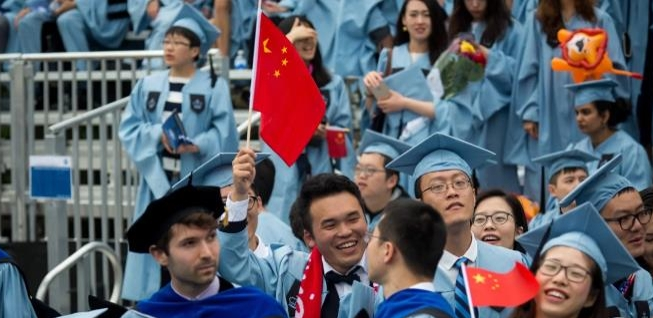
Chinese universities have actively sought to attract students from their countries, targeting students studying in the United States.
According to the South China Morning Post in Hong Kong on Monday, the Shanghai Fudan University’s 2025 Ph.D. program includes special admissions for international undergraduate students. Students who attend one of the world’s top 100 universities or who are enrolled in elite programs are exempt from recommending a master’s degree or affiliated university, which is a requirement for admission to a Ph.D. program at a Chinese university. The program is applied to 18 majors including advanced fields such as computer engineering, biomedical engineering and clinical medicine, as well as some humanities.
Fudan University has been quietly operating the admissions process since 2022. However, when the guidelines for entrance examinations were introduced this year, the program drew much attention as it coincided with the U.S. move to reduce financial support for university education. Despite controversy over privileges, Chinese higher education officials have an attitude that they should take advantage of the opportunity.
We can give opportunities to students who want to study in their homeland and broaden the university’s talent selection channel, said Chaishanpa, head of the Shanghai Tongji Higher Education Research Institute, to SCMP.
There is also a view that it is necessary to bring back talented people who have gone overseas as a national strategy. Chen Zhiyun, an education researcher at the China Educational Development Strategy Association, told the Dilipai Shimbun that it is necessary to independently nurture talented Chinese students at a time when it is increasingly difficult for them to study in Western countries due to the U.S. and Western countries’ checks on China. “The Pudan University entrance exam will be an important initiative to attract outstanding foreign talents.”
In October last year, Zurich University of Arts in Switzerland suspended cooperation with Harbin University of Technology, China’s seventh defense base school. During the first Trump administration, the U.S. government implemented the “China Initiative” to catch spies who are infiltrating academia and stealing technical information and intellectual property rights (IP). Several Chinese scholars were investigated, research funding was suspended, and more than 300 joint studies between the U.S. and China were suspended.
Against this backdrop, several Chinese universities, in addition to Fudan University, have been actively trying to attract international students. Since last year, Tsinghua University has established special admissions for Chinese international students abroad with some majors in its doctoral dissertation syllabus. Founded in 2018 with the aim of becoming a research-oriented university at the level of the California Institute of Technology, Hangzhou Municipal University is also actively recruiting Chinese international students for doctoral courses in mathematics, material science and engineering, computer science, and environmental science.

Since the inauguration of the Trump administration, the U.S. and China have taken different steps toward higher education. The U.S. is taking a sharp edge toward higher education.
On the 27th of last month, the White House Office of Management and Budget suspended all federal subsidies and loans and ordered federal agencies to submit a report to analyze whether the programs that had been supported conformed to the Trump administration’s policy stance, but withdrew them two days later after confusion broke out. University scholarships and research programs were also targeted to filter out policies that did not match the state administration’s stance.
The measure was put on hold, but it was enough to shock the U.S. education community. Vanderbilt University, Columbia University and other universities have announced that they will reduce the number of admissions for graduate students next year after the White House announced its guidelines.
China has promised to provide financial and political support to key areas such as medicine and engineering. In October last year, the State Department and the Communist Party of China called on education authorities and universities to “deepen comprehensive reforms in doctoral education” and “become the hub of PhD education in the world” to meet the government’s technological independence policy.
EJ SONG
US ASIA JOURNAL



